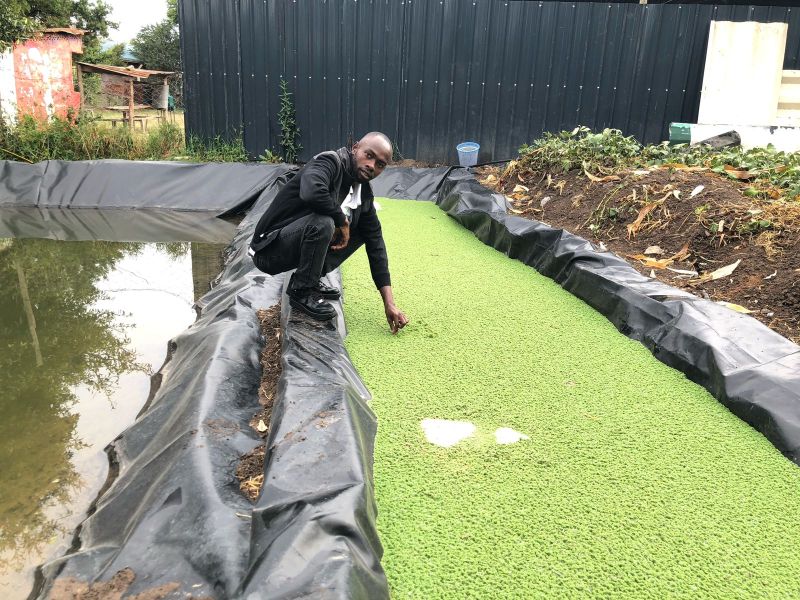Azolla: The Miracle Plant for a Greener Future
🌿
As the impacts of climate change become more severe, finding sustainable and eco-friendly solutions is critical. One such solution comes from an unexpected source—a small, fast-growing aquatic plant called Azolla. Often overlooked, Azolla has immense potential to combat climate change, support sustainable agriculture, and reduce carbon emissions.
What is Azolla?
Azolla is a floating fern that grows in freshwater environments. It has a unique symbiotic relationship with nitrogen-fixing cyanobacteria (Anabaena azollae), allowing it to capture atmospheric nitrogen efficiently. This quality makes it an excellent natural fertilizer and a valuable resource for farmers looking for sustainable alternatives to chemical fertilizers.
Above: Daniel from PCDP observing Azolla at the office farm
Azolla’s Benefits in a Changing Climate
1. Carbon Sequestration and Climate Change Mitigation
Azolla has an extraordinary ability to absorb carbon dioxide (CO₂) from the atmosphere. Studies suggest that it can absorb CO₂ at a much higher rate than trees, making it an excellent natural tool for carbon sequestration. By cultivating Azolla in water bodies, we can help reduce greenhouse gases and slow down global warming.
2. Sustainable Agriculture and Food Security
Azolla is a natural biofertilizer that enriches the soil and improves crop yields without the harmful effects of synthetic fertilizers. It has been widely used in rice farming, where it improves soil fertility and reduces the need for chemical nitrogen inputs.
Additionally, Azolla is a highly nutritious animal feed, rich in protein, essential amino acids, and vitamins, making it an excellent supplement for livestock, poultry, and even fish farming. This can help reduce dependence on expensive, environmentally damaging feed sources like soybean meal.
3. Water Purification and Ecosystem Protection
Azolla helps improve water quality by absorbing excess nutrients such as nitrogen and phosphorus, which are often responsible for harmful algal blooms. It can be introduced into polluted water bodies to naturally purify water, making it a valuable tool for environmental conservation and sustainable water management.
4. Drought Resilience and Water Conservation
Unlike conventional crops that require extensive irrigation, Azolla thrives in stagnant or slow-moving water with minimal inputs. This makes it a sustainable option for farmers in drought-prone regions, where water scarcity is becoming a significant challenge due to climate change.
5. Biofuel Potential
As the world seeks alternative energy sources, Azolla is being studied for its potential use in biofuel production. Its high biomass productivity and ability to grow rapidly without competing for arable land make it an exciting candidate for renewable energy generation.
Azolla: A Solution for a Sustainable Future
Azolla’s benefits go beyond just agriculture—it has the potential to address multiple environmental challenges simultaneously. Whether it’s sequestering carbon, reducing dependence on synthetic fertilizers, purifying water, or providing a sustainable source of food and feed, this tiny plant could play a big role in climate change adaptation and mitigation.
How Can We Promote Azolla Cultivation?
- Encourage farmers to use Azolla as a biofertilizer and livestock feed.
- Promote research into its potential for biofuel and carbon sequestration.
- Support policies that integrate Azolla into climate resilience strategies.
- Educate communities about its environmental and economic benefits.
By harnessing the power of Azolla, we can take a step closer to a greener, more sustainable future; one that is resilient in the face of climate change.
Reach out to PCDP for more information about Azolla through our social media platforms:
TikTok: Pioneercdp-Official X: pioneer_cdp
Facebook: Pioneer Child Development Programme Official-PCDP
YouTube: PioneerCDP-Official Instagram: pioneercdpofficial


Leave A Comment
All fields marked with an asterisk (*) are required